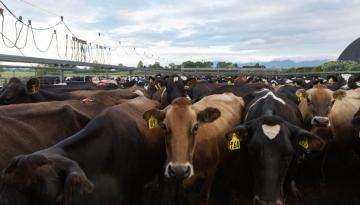
The dairy industry wants New Zealanders to fall back in love with life on the farm.
With Covid-19 meaning the migrant workforce is not available, it is predicted the sector will need to fill 1000 jobs in time for Moving Day on 1 June - the first day of the new dairy season.
The Fortuna Group is a corporate farming operation in Southland which milks about 12,000 cows across 19 farms.
At any one time 50 percent of its 100-strong workforce are migrants, predominantly from the Philippines.
Chief executive Matthew Richards said he was down 15 migrant staff at the moment and that would soon present problems.
"If we are not fully staffed it does create some real concerns around how are we going to do the job. About how we are going to meet expectations around the animal welfare environment and looking after the staff we do have. Making sure that they get their regular days off and are not having to do too many hours."
Richards said he was hoping Kiwis would take a second look at farming.
"We do see some opportunities potentially with the unemployment rate lifting. It creates more of a pool of potential applicants but we've just got to sell ourselves better and definitely we'll attract some. But we're still going to need the migrant workforce in there as well because they've got a lot of experience."
Federated Farmers national dairy group chairperson Chris Lewis said migrants make up about 18 percent of the dairy workforce and filled up to 4000 jobs.
He reckoned despite the government rolling over expired visas for migrants already in the country until September, there would still be a shortage of about 1000 workers.
"We can't bring in any new migrants for June 1 and there were quite a few coming in for the change-over being Moving Day or Gypsy Day. So we're just trying to work through just how big the shortfall is and putting some plans in place to recruit some of the New Zealanders who have found themselves redundant because of Covid-19."
Lewis said farming had gotten a bit of a bad rap for being hard, dirty work over the past decade, he reckoned there was plenty of upside.
"You might get up a bit earlier at around 5am, but on the other hand my staff go home for an hour at breakfast, an hour at lunch and they're home by 5pm.
"We have housing and housing at affordable rates. We have meat, we have milk, you know. My staff get a bit of cheese and a bit of honey that's made on the farm and they get to spend more time with their families."
Lewis said an entry level-dairy assistant could expect to earn about $50,000 a year and quickly advance if they apply themselves.
Managing director of farming recruitment company, The Regions, Ben De'Ath, said it was unlikely New Zealanders would ever fill all the vacant farm jobs.
He thinks there is another pool of potential workers among those queuing for food parcels in Queenstown and elsewhere - migrant work visa holders who have lost jobs in tourism, retail, hospitality and construction.
"Covid-19 related redundancies from work visa holders need to be allowed to change profession. They are able-bodied people with active minds who have come to New Zealand to make a better life. Some of them will be keen and willing to learn how to milk a cow."
De'Ath said current rules about changing job, employer or region were too restrictive and other opportunities for these workers were going begging.
Immigration New Zealand said changes had already been made to temporary work visa settings to ensure the country had the critical workers it needs.
But it warned that allowing visa holders to change region would not be considered at this stage due to public health considerations.
RNZ


